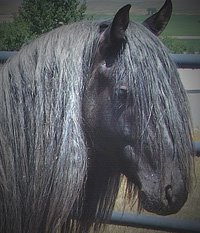The downside of inquisitiveness is that there will never be enough time for me to cover all the material that interests me. The upside is that I can still cover quite a bit and put it to good use. Nutrition and fitness, perennials in my self-guided researches, offer myriad opportunity for testing theories on my favorite guinea pig -- myself. Over the past few years, I've intensified my focus on these issues and made discoveries that led to dietary changes that most of society considers fringe at best -- and often downright barmy.
Well. Call me crazy if you like, but there's no question that I'm leaner, stronger, and fitter today, at thirty-one, than I've been since the day I was born. Good thing, since I believe that as an endurance rider, I'm honor-bound to be every bit the athlete I ask my equine partner to be.
I've already shared three of the significant, dietary shifts I've implemented, in the form of three rules for eating clean. These are the non-negotiables:
As I said before, Eating Clean Rule #1 is almost enough, all by itself. Remove all barcoded (that is, processed) "foods" from your diet, and you'll be left with the fuels your body was designed to ingest: Vegetables, fruits, meats, grains, dairy, eggs, nuts, seeds, and plant oils. If 95% or more of your daily intake comprises these foods, you'll be better off than 95% of Western civilization.
However, for those who are really serious about eating clean and getting lean, there are many issues among these non-barcoded foods that merit discussion. I'll touch the surface of the most prominent here, then hook you up with sources for additional research. Let's start with dairy:
 Now, I just included dairy in a list of foods our bodies are designed to ingest, and so they are...or at least, they were. But when was the last time you saw a yearling foal nurse? A three-month old kitten? A six-month-old lamb?
Now, I just included dairy in a list of foods our bodies are designed to ingest, and so they are...or at least, they were. But when was the last time you saw a yearling foal nurse? A three-month old kitten? A six-month-old lamb?Hmm. Seems they grow out of it. In fact, a little research reveals that their bodies -- and ours -- are clearly meant to grow out of it. Lactase, the enzyme that enables digestion of lactose, ceases to be produced in animals over weaning age. Continued consumption of milk, formerly the perfect food for Junior, thereafter results in gastrointestinal distress ranging from bloating to diarrhea.
Many of you know exactly what I'm talking about; those who don't are the lucky (?) recipients of a mutant gene that permits continued lactase production. Being one-quarter Swedish, a heritage that predisposes me to said mutant gene (and perhaps a few others as well), I am not lactose intolerant -- unlike about 25% of the U.S. population and 75% of people whose heritage is African, Asian, or American Indian.
But, I still avoid dairy.
Why? Well, let's go back to our fellow mammals: How often do you see a rat drinking hamster milk, a bear cub nursing from a cougar, or a goat suckling a fawn? Yes, photos of such anomalies make their way around the web periodically. The last one I saw involved a mama dachshund and a litter of piglets. (Or was it the other way around?) Regardless, the only reason photos like that are so popular is that cross-species nursing is downright weird!
Surely I'm not the only one who finds it bizarre that we humans habitually consume large quantities of a substance custom-made to transform an 80-pound calf into a 1,800-pound bull. (And we're supposed to believe that drinking milk will make us lose weight? Excuse me?)
Besides that, the vast majority of the dairy products in your local grocery store are highly processed remnants of what might once have been a marginally acceptable food. Factory farms don't squeeze milk right out of the cow and into a carton, you know. Not by a long shot. First, they heat the milk to kill off bacteria (including the beneficial kind), a process which also reduces its vitamin A, C, D, and E content and destroys B6 and B12 outright. Then, they force it through a strainer with tiny holes, breaking up the fat molecules to prevent separation -- and bastardizing the natural hormonal delivery system of the milk, whose steroids and proteins are now able enter the bloodstream in a manner that nature never intended, triggering unnatural growth the body is unable to control.
Sounds to me like a recipe for cancer.
Those are just a few of the crazy reasons I rarely consume dairy. Feel free to pop a couple Lactaid pills, fetch a bowl of (barcoded, sugar-laden) ice cream, and take potshots at them at your leisure. When you're finished, I dare you to go read this series over at Fitness Spotlight. Allergens, antibiotics, and osteoporosis, oh my! (If you're horrified at the prospect of sacrificing dairy, be sure to check out the section on raw milk, wherein you may find some consolation. The nuances of aged dairy products such as yoghurt and cheese may interest you, as well.)
Okay. Take a moment to digest the truth about milk -- which, thanks to the Dairymen's Counsel and its well-funded friends in government, may be even more difficult than digesting the milk itself -- and in the next post, we'll move on to meat and eggs. (Don't worry. I promise not to advocate giving them up.)
_________________________________________________________
Related Posts
Fit to Ride, Part One: Going for the Goal
Fit to Ride, Part Two: Vice and Advice
Fit to Ride, Part Three: Eating Clean
Fit to Ride, Part Four: Sweet Surrender
Fit to Ride, Part Five: Eating Green
Straight Sailing: Thoughts on Fitness for Endurance Riders
_________________________________________________________
Want to read more posts like this one?










10 comments:
agree for the most part tho i dont think i could do it without my yogurt :)
gp
You could do worse than yogurt, gp -- particularly if you track down a product made from raw, organic, and grass-fed milk. :)
The only thing that's difficult--difficult but not impossible--is what to pair with another food that's not good, esp. given the quantities I consume it in: coffee. I like it with milk. And it's hard to find raw, unprocessed milk in Hawaii. I have been trying to kick dairy for years. There needs to be a 12-step program for aspiring vegans.
Kim, your comments always make me smile. :) The beauty of dietary decisions is that they don't have to be made all at once, and occasional exceptions won't send you straight into your grave. (I ate some ice cream just last week, in fact, albeit from a local and hormone-free dairy.)
As for your coffee, I have one idea: Try coconut milk. (Remember, it's carbs and calories that bear watching out for, not fat. Dietary fat will not make you fat. Need proof? Wait 'til you see what I eat.) ;)
First off,
Since I work for the Dairy Industry, I can't say I would give up my milk consumption any time soon.
I tried drinking soy milk once, just to see if I would like it and I have to say that I do not. I even tried the chocolate version and I don't like that either.
Regular skim milk is what I prefer. I agree that is an interesting misnomer that people believe eating fat makes them fat. It does not. I am a large person and I eat very little fat. I have had bouts with gatro enteritis over the past 8 years or so and doctors have determined that the thing that sets it off with me is fat consumption. My stomach reacts stongly to anything high fat in my diet....so I can honestly say I am not a big person due to my fat consumption -- I eat very little of it.
Along with that I can also say that I am very grateful that we CAN filter out some of the fat content in milk or it would be something I would not be able to enjoy very often. Raw milk on a regular basis would make me ill due to the fat content, not too mention the risk of ingesting Salmonella or Listeria. I would hardly classify the filtering of milk in the same group of "processed foods" as adding preservatives. While I can see adding perservatives and chemicals as being a bad thing -- taking something OUT of a natural substance??? I don't see the harm there -- you are just not getting it....and in the case of fat in milk -- well that's a good thing for me -- to not have it, that is.
A few other things that made me raise my eyebrows as to what people say....
That milk you buy in the store would/may contain Antibiotics. I have heard this before and...well... No - it doesn't. In fact farmers carry insurance to cover them for the loss of milk should a cow with antibiotics get into their supply. In the case of this happening, they will usually end up paying for an entire tanker of milk to be dumped as it cannot be consumed. This is in the thousand pound range which can add up to big time $$ -- hence the reason for the insurance. Anyone telling you there is antibiotics in milk is wrong, wrong, wrong...unless they are knowingly drinking their own treated milk.
The big rBGH debate.... I agree for the most part with what is said on this. It's wrong. It's bad for the cows. I don't know of any human who would willingly want to drink it. The bottom line with this though is that there is NO guarantees that ANY milk is rBGH free unless you specifically know the farmer making it does not use the hormone in their cows. This is simply word of mouth. There is currently no test that can detect it in milk. I guess if you are afraid of ingesting this, it's another reason to drink that awful soy milk (sticks tongue out).
As far as getting cancer. Well it seems to me these days EVERYTHING causes cancer according to some people. Don't drink out of plastic bottles. Don't eat stuff out of the microwave. Don't go outside. Don't ride in cars (the exaust will kill you). I think that genetics plays a HUGE role in someone's chances of getting cancer. If this nasty ailment runs in your family, then eating better is definitely worth your while!!! I heard of people who take exceptional care of their bodies, exercising and not smoking and eating well that still get cancer by the time they're 40. Other people eat crap and smoke and don't care and live to be much older. I point the finger at genetics there..and diet as only secondary. There is always going to be someone who thinks if you do "X" you will get cancer, so I don't take much stock in a lot of what I read about that anymore.
I did like the analogy you gave about babies being weaned off of their mother's milk and this as a possible reason for being lactose intolerant. Very, very interesting! I hadn't thought of it like that before. For those in that situation....well I hope they like the soy milk (smiles).
Excellent post tho- It certainly gives people something to think about..
I'm also going to be unable to hold my tongue here--as a person in the veterinary field it is my duty to be educated in these matters. I would severely caution anyone against drinking raw milk, and it is not because I have been "corrupted" by the FDA or dairy industry--rather, it is a simple matter of public heath.
Pasteurization of milk is not a random bastardization of milk and removal of all things bad and good. Rather, it is a process designed specifically to target and kill a microorganism called Coxiella burnetti, which is the causative agent of Q fever. This organism exists in many of our farm animals including cows, and carriers of this bacteria appear extremely healthy. Although C burnetti is not the only target of pasteurization, it is one of the big players in the development of the process.
Q fever in humans is not a disease to be laughed at. It can cause serious symptoms such as high fever, lethargy, weight loss and pneumonia, and may cause death in weak or immunocompromised individuals.
I personally drink organic milk only. I love milk, thank God every day I am not lactose intolerant, and enjoy that I can support the organic dairy industry with my gallon dollars. I don't necessarily support the use of antibiotics and growth hormones, and have very positive personal experiences on an organic dairy farm. The cows on this particular organic dairy were happy, relaxed, grass-fed, and antibiotic free.
My two cents.
Carol and Elly -- Thanks for sharing your perspectives! There's no doubt that the dairy debate is a hot one, with flaming arguments on both sides.
I should clarify that rather than seeking out raw milk, my personal decision is to simply avoid dairy (for the most part; I do usually have a carton of whole-milk yogurt in the refrigerator for occasional use as a condiment, and I use cheese once or twice a month).
Soy milk is at least as processed as dairy milk, so I don't use it much, either. :)
I do believe that removing part of a food renders it unnatural, as surely as does adding in something that wasn't there originally. Take the conversion of wheat kernels to white flour, for example -- not remotely the same, nutritionally...and that's without damaging the molecules as occurs during homogenization of milk (to my current knowledge, anyway...)
About life in general causing cancer -- I had to laugh, Carol, because I've said the same thing many times! Interestingly, Dr. Patrick Quillin writes that we call get cancer multiple times throughout our lives and never know it because our bodies manage to beat it back. I'm not paranoid about it, but I do try to give my body all the weapons I can, while not inviting known enemies onto my turf.
A quick note about dietary fat: It's my understanding that eating fat DOESN'T make us gain body fat. That's sugar's job. See Part Four of this series for more on that subject.
Finally, thanks again for sharing your thoughts. I'm all for encourange everyone to make their own, informed decisions! :)
Not a milk drinker here, never have been but I do use it on my cereal but its skim (the cereal is not fruitloops I promise), I am a cheesehead and I love Greek yogurt, especially Chobani brand. When I was a baby, I had to have goat milk. I was allergic to cow milk and now I don't think it really bothers me but I still couldn't ever drink a glass of milk just to drink it. I found your comparison of other mammals vs humans and milk drinking interesting. Guess I never thought about that but it something worth thinking about. I do have to ask about your calcium , Vitamin D intake. How do get enough if you restrict dairy so much? Do you use vitamin supplements?
Thanks for bringing up the calcium question, Jonna. I should have addressed that in my post, because I remember how shocked I was to learn, several years ago, that I didn't actually need dairy for calcium! I mean, isn't that "fact" right up there with "the sky is blue" and "the earth is round"??? ;)
Plant sources, particularly nuts, legumes, and leafy greens provide plenty of calcium -- particularly at the volume in which I consume them (5-7 cups of raw, leafy greens plus half a cup of raw broccoli and a whole bunch of other veggies, plus several servings of nuts and some legumes, is quite standard for my daily intake). Fatty fish, of which I eat 4-7 servings weekly, is another good source of calcium.
Furthermore, have you noticed that we dairy-swilling Americans have sky-high osteoporosis rates compared to cultures that consume little dairy? Yes, that's correlation, not causation, but still...hmmm... Many experts point to the acidity of our diets (due to overzealous consumption of animal products, including dairy) as the culprit. The problem isn't that we lack dietary calcium, but that our bodies are so acidic that we cannibalize our own bones for their alkaline effect, thereby weakening them over time.
As for Vitamin D -- if you could see my suntan, you wouldn't worry about that! I'm pretty sure my skin manufactures enough Vitamin D for several armies. Just in case, I also get it from eggs and fish. :)
I don't take any supplements at all. I believe that their artificially high doses of nutrients (which are sometimes synthetic, always in unnatural proportions, and missing the phytonutrients whose synergy they require for effectiveness) actually do more harm than good.
Finally, a word about skim milk and low-fat dairy products in general: Doesn't it stand to reason that they are actually LESS healthful than their full-fat counterparts? After all, they've undergone additional processing that renders them more different than ever from their original state. Remember, fat is not the enemy! (Natural fat, that is, as opposed to the manmade fats in barcoded psudofoods!) Eating healthful fats will not make you fat. What little dairy I consume is as organic, whole, and full-fat as I can find. :)
Hi Tamara- thanks for the added comments. I suspected your intake would not be by supplements! Leafy greens are key in the diet. I eat a lot of spinach and other leafy greens as well as nuts. Drinking milk to get enough calcium is drilled into our brains from a yound age so I guess conceptually it's a tough one to come to terms with. As with any good advertising campaign, it has worked for many years. I am also glad you mentioned the osteoporosis topic. I will have to read up on that more because it is something I have often wondered about. Everytime I turn around there is a new drug on the market to help "fight" it. As with anything else , it would seem we should be able to find a better solution than just plan on going on medication as we age. One area for me that makes it difficult is the consumption of fish. I do not like fish. Very Occasionally I will grill a salmon steak or swordfish but that's about it. Just never liked the flavor of it. I am allergic to shellfish, or the iodine in the shellfish would probably be more accurate. I do supplement with fish oil but I am awful about remembering to take the darn things! I will mention that I have started to talk Tom into getting more on board with eating better and he told me he is feeling better as a result. Its a slow process with him but something is better than nothing. Thanks for all the interesting information you are putting out there. It inspires me to do further research of my own.
Post a Comment